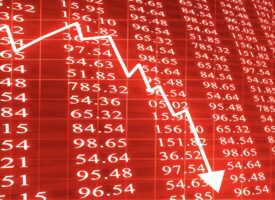On the heels of what has been a wild start to 2017, a multi-billon dollar fund manager’s doomsday prediction has sent shockwaves across the internet.
Stephen Leeb: “As I was thinking about my interview today, KWN’s viral Doomsday interview with Victor Sperandeo has sent shockwaves across the internet and it reminded me of something I have been neglecting. Nativism, populism, whatever you want to call it, is not something unique to America. Brexit could easily be followed by the Netherlands and even France dropping out of the euro zone in the wake of elections being held this year. Yes, Victor is right when he states that ‘absolute f*cking chaos’ across the globe will be the result.
The Great Depression Radically Changed The Global Landscape
But as in America it will be chaos followed by fantastical efforts to spur growth – even Germany will follow the hyper-growth path – finally remembering that it was not hyperinflation that led to Hitler, or even a fall in the government. The Weimar Republic remained in charge of Germany throughout 1933. It was the Great Depression – the worldwide economic meltdown – that brought Hitler to power. Gerald Celente summed up the situation perfectly in his KWN interview:
“Look, if Sperandeo is correct, we are gong to see the ‘f*cking chaos’ that he is talking about, and it’s going to be global.”
 An Out Of Control World
An Out Of Control World
With the disintegration of Europe, the entire West, to the extent it can stay out of China’s hands, will be flailing blindly to keep growth intact at any cost. The end result will be social upheaval, commodities out control, and gold vaulting to new highs with no end in sight, and economic desperation on a scale that will make the last few years seem utterly tame. And this is not even a worst case, for it doesn’t take into account military developments. Just today, Iran – a relatively small military power compared to the U.S. – defied America and tested another missile. And if it should come to war in the South China Sea, China – assuming it remains a conventional war – will come out on top. In a previous KWN interview I pointed out that America has no answers to hypersonic missiles that would leave American aircraft carriers sitting ducks. Yet we persist in denial. Yes, Victor is right that these are dangerous times…
IMPORTANT…
To find out which company is set to become one of the
highest grade producing gold mines on the planet
CLICK HERE OR BELOW:
But let’s be optimists for a moment and assume that all the above notwithstanding, the world will somehow manage to stay relatively calm. In that case, what should we expect? In particular, what would be the outlook if Trump fulfills his campaign promises to bolster the middle class and bring about broad-based growth? Right off the bat, I can say this: his plan to do so – via infrastructure spending and lower taxes – will almost surely lead to a bout of high, and possibly very high, inflation. That’s especially true since part of his push will entail leaning on the Fed to keep interest rates relatively low so as not to choke off productivity-enhancing infrastructure growth. That will mean negative real rates (rates lower than inflation), which will further fan inflation.
Here’s the other thing I can say with conviction: one sure winner will be gold and gold correlates. High and rising inflation and negative real rates are manna for the metal, particularly when inflation is led by rising commodity prices. The two great gold bull markets of modern times were in the 1970s and in the 11 years between 2001 and 2012. In both periods, commodities, overall, rose sharply while interest rates were below inflation.

When real rates are negative, paper money left fallow loses value because interest rates don’t compensate for rising inflation, and this encourages investment and spending. But gold, in contrast to paper money, will typically maintain purchasing power – or better – because it will appreciate as much as or more than inflation. And when negative rates are joined by rising commodity prices, the conditions are in place for a multifold gain in the price of gold.
A policy of infrastructure spending and lower taxes might succeed, and most important, it might boost productivity. But it’s not a slam dunk because the challenges are enormous. Most crucial to its long-term success will be how well the U.S. will be able to handle commodity scarcities, or indeed, whether these can be managed at all. And on this score I’m not optimistic.
The U.S. seems to be counting on being able to deal with any issues of scarce commodities by substitution and technology. But unless we are substituting renewable resources for nonrenewable ones – wind for oil, for example – we’re at best just kicking the can down the road. Lithium, for instance, currently the commodity du jour, has some wonderful properties that let it store energy. It’s integral to electric cars and provides a means to store the sun’s energy. But lithium, like oil, copper, and zinc, is finite. And in a world in which developing nations with their billions of people are racing to catch up economically, the strains on lithium and other commodities will be accelerating sharply.
It’s possible that technology may imbue commodities like lithium with longer lives, or discover ways to let us substitute more plentiful commodities for scarcer ones. But an enduring obstacle will be the intricate interdependencies among commodities. In my last interview I talked about those involving the existential commodities, food, energy, and water (FEW). And indeed, even in the case of a nearly inexhaustible commodity like iron ore, limits to how much can be extracted are imposed by access to energy, and water (and ultimately even food, since miners need to eat).
So far technology gets fairly high grades in that it has helped us use less energy, waste less water, and develop more robust and fertile seeds for producing food. But it hasn’t led to improved productivity, the major reason so many Americans have been left behind. Technology has kept us from falling into an even deeper hole but hasn’t enabled us to climb out of the hole we’re in. That’s why on balance I’m pessimistic. While the current administration’s plans will likely boost growth initially, absent major technological breakthroughs growth will be constrained by growing commodity scarcities. In other words, it won’t be sustainable growth. This will be great for gold, but not for the country at large.
The Roots Of My Pessimism
My pessimism is rooted in what I see as Americans’ misguided belief that we are the world’s technology kings and that we can always rely on technology to bail us out. Take a recent study by well-respected consultant Deloitte and the U.S. Council on Competitiveness. It places China first in manufacturing competitiveness largely because of cost advantages but forecasts the U.S. will surpass the Middle Kingdom by 2020 because of rising wages in China, and America’s supposed lead in technology, infrastructure, and energy policy. I would term that latter assertion delusional.

On the same day I saw this study I came upon two others. One indicated that China, already the world leader in supercomputers, would by yearend have a prototype of a supercomputer more than 10 times as powerful as its current most advanced model. As I’ve noted before, having a lead in supercomputer technology means leading in almost all technologies from digital currencies to health diagnosis to artificial intelligence.
The second report was equally troubling. It showed that HackerRank, the world’s leading provider of competitive programming exams, ranks the world’s leading programmers as the Chinese followed very closely by Russia. Just as in tests of reading and math, the U.S. is below the middle of the pack at 28. Solving the most difficult problems of the 21st century will likely require – at least as tools – the use of the most powerful computers and best programmers. Is it too late for another post-Sputnik kind of rebound? Very likely, because we’re in such denial that we don’t even know it is needed.

If we falter and China does not, the argument for gold will be even stronger. Whatever your assessment of Trump, gold should underpin your portfolio, both because of the likelihood of enormous gains from an unmatched bull market and because it’s far and away the best insurance in what promises to be a very tumultuous world.”
***KWN has also just released the remarkable audio interview with top trends forecaster in the world Gerald Celente and you can listen to it by CLICK HERE OR ON THE IMAGE BELOW.
***ALSO JUST RELEASED: World’s Foremost Trends Forecaster Says Sperandeo Is Right – There Will Be ‘Absolute F*cking Chaos’ Across The Globe CLICK HERE.
 © 2017 by King World News®. All Rights Reserved. This material may not be published, broadcast, rewritten, or redistributed. However, linking directly to the articles is permitted and encouraged.
© 2017 by King World News®. All Rights Reserved. This material may not be published, broadcast, rewritten, or redistributed. However, linking directly to the articles is permitted and encouraged.








